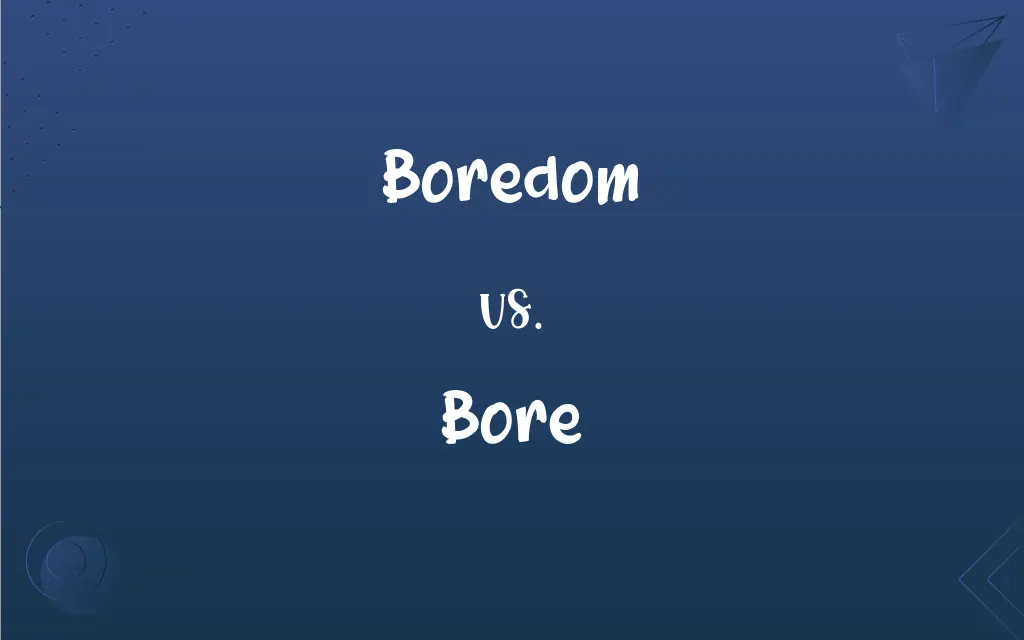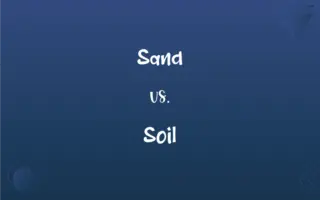Boredom vs. Bore: What's the Difference?
By Janet White || Updated on March 4, 2024
Boredom is the state of feeling uninterested and weary due to a lack of stimulation or excitement, while bore refers to causing this feeling in others.

Key Differences
Boredom is an emotional or psychological state experienced when an individual finds themselves in a situation lacking interest, excitement, or engagement. This state often leads to feelings of lethargy and dissatisfaction. In contrast, bore, as a verb, refers to the act of causing boredom in others. It involves situations, actions, or presentations that fail to capture interest or engagement, leading the audience or participants to feel uninterested and weary.
Boredom is subjective and varies greatly among individuals based on their interests, dispositions, and thresholds for stimulation. What bores one person may be engaging to another, highlighting the personal nature of boredom. Conversely, the capacity to bore is not limited to persons but can extend to tasks, events, or environments. A task that is repetitive, lacks challenge, or does not provide meaningful feedback can bore individuals, leading to a decrease in motivation and performance.
Both boredom and the ability to bore have implications for various fields, including education, workplace productivity, and entertainment. Understanding boredom can help in designing more engaging curricula, work environments, and content that captures and maintains interest, while recognizing what bores others is crucial for effective communication and interaction.
Comparison Chart
Definition
A state of feeling uninterested and weary.
To cause feelings of boredom in others.
Nature
Subjective emotional state.
Action or effect causing boredom.
ADVERTISEMENT
Common Causes
Lack of stimulation or engagement.
Unengaging content or delivery.
Subjectivity
Varies greatly among individuals.
Can be more universally recognized.
Implications
Can affect personal satisfaction and productivity.
Important for effective communication and design.
Boredom and Bore Definitions
Boredom
Can lead to seeking new, stimulating activities.
Boredom drove him to take up a new hobby.
Bore
To cause someone to feel bored.
The monotonous speech bored the audience.
ADVERTISEMENT
Boredom
A feeling of weariness and disinterest due to lack of excitement.
She felt boredom during the long lecture.
Bore
Can refer to people, tasks, or situations.
Long, uneventful meetings can bore employees.
Boredom
Experienced in situations lacking novelty or challenge.
Repetitive tasks often lead to boredom.
Bore
To make a hole in or through, with or as if with a drill.
Boredom
Affects motivation and attention.
Boredom in class affects students' learning outcomes.
Bore
To form (a tunnel, for example) by drilling, digging, or burrowing.
Boredom
The condition of being bored; ennui.
Bore
To make a hole in or through something with or as if with a drill
"three types of protein that enable the cells to bore in and out of blood vessels" (Elisabeth Rosenthal).
Boredom
(uncountable) The state of being bored.
Bore
To proceed or advance steadily or laboriously
A destroyer boring through heavy seas.
Boredom
(countable) An instance or period of being bored; A bored state.
Bore
To make weary by being dull, repetitive, or tedious
The movie bored us.
Boredom
The state of being bored, or pestered; a state of ennui.
Bore
Past tense of bear1.
Boredom
The realm of bores; bores, collectively.
Bore
A hole or passage made by or as if by use of a drill.
Boredom
The feeling of being bored by something tedious
Bore
A hollow, usually cylindrical chamber or barrel, as of a firearm.
Boredom
Subjective and varies by individual.
What causes boredom in one person may entertain another.
Bore
The interior diameter of a hole, tube, or cylinder.
Bore
The caliber of a firearm.
Bore
A drilling tool.
Bore
One that is wearingly dull, repetitive, or tedious.
Bore
(transitive) To inspire boredom in somebody.
Reading books really bores me, films are much more exciting.
Bore someone to death
Bore
(transitive) To make a hole through something.
Bore
(intransitive) To make a hole with, or as if with, a boring instrument; to cut a circular hole by the rotary motion of a tool.
To bore for water or oil
An insect bores into a tree.
Bore
(transitive) To form or enlarge (something) by means of a boring instrument or apparatus.
To bore a steam cylinder or a gun barrel; to bore a hole
Bore
(transitive) To make (a passage) by laborious effort, as in boring; to force a narrow and difficult passage through.
To bore one's way through a crowd
Bore
(intransitive) To be pierced or penetrated by an instrument that cuts as it turns.
This timber does not bore well.
Bore
(intransitive) To push forward in a certain direction with laborious effort.
Bore
(obsolete) To fool; to trick.
Bore
A hole drilled or milled through something, or (by extension) its diameter.
The bore of a cannon
Bore
The tunnel inside of a gun's barrel through which the bullet travels when fired, or (by extension) its diameter.
Bore
A tool, such as an auger, for making a hole by boring.
Bore
A capped well drilled to tap artesian water.
Bore
The place where such a well exists.
Bore
One who inspires boredom or lack of interest; an uninteresting person.
My neighbour is such a bore when he talks about his coin collection.
Bore
Something dull or uninteresting.
What a bore that movie was! There was no action, and the dialogue was totally uncreative.
Bore
Calibre; importance.
Bore
A sudden and rapid flow of tide occurring in certain rivers and estuaries which rolls up as a wave.
Bore
To perforate or penetrate, as a solid body, by turning an auger, gimlet, drill, or other instrument; to make a round hole in or through; to pierce; as, to bore a plank.
I'll believe as soon this whole earth may be bored.
Bore
To form or enlarge by means of a boring instrument or apparatus; as, to bore a steam cylinder or a gun barrel; to bore a hole.
Short but very powerful jaws, by means whereof the insect can bore, as with a centerbit, a cylindrical passage through the most solid wood.
Bore
To make (a passage) by laborious effort, as in boring; as, to bore one's way through a crowd; to force a narrow and difficult passage through.
Bore
To weary by tedious iteration or by dullness; to tire; to trouble; to vex; to annoy; to pester.
He bores me with some trick.
Used to come and bore me at rare intervals.
Bore
To befool; to trick.
I am abused, betrayed; I am laughed at, scorned,Baffled and bored, it seems.
Bore
To make a hole or perforation with, or as with, a boring instrument; to cut a circular hole by the rotary motion of a tool; as, to bore for water or oil (i. e., to sink a well by boring for water or oil); to bore with a gimlet; to bore into a tree (as insects).
Bore
To be pierced or penetrated by an instrument that cuts as it turns; as, this timber does not bore well, or is hard to bore.
Bore
To push forward in a certain direction with laborious effort.
They take their flight . . . boring to the west.
Bore
To shoot out the nose or toss it in the air; - said of a horse.
Bore
A hole made by boring; a perforation.
Bore
The internal cylindrical cavity of a gun, cannon, pistol, or other firearm, or of a pipe or tube.
The bores of wind instruments.
Love's counselor should fill the bores of hearing.
Bore
The size of a hole; the interior diameter of a tube or gun barrel; the caliber.
Bore
A tool for making a hole by boring, as an auger.
Bore
Caliber; importance.
Yet are they much too light for the bore of the matter.
Bore
A person or thing that wearies by prolixity or dullness; a tiresome person or affair; any person or thing which causes ennui.
It is as great a bore as to hear a poet read his own verses.
Bore
A tidal flood which regularly or occasionally rushes into certain rivers of peculiar configuration or location, in one or more waves which present a very abrupt front of considerable height, dangerous to shipping, as at the mouth of the Amazon, in South America, the Hoogly and Indus, in India, and the Tsien-tang, in China.
Bore
A person who evokes boredom
Bore
A high wave (often dangerous) caused by tidal flow (as by colliding tidal currents or in a narrow estuary)
Bore
Diameter of a tube or gun barrel
Bore
A hole or passage made by a drill; usually made for exploratory purposes
Bore
Cause to be bored
Bore
Make a hole with a pointed power or hand tool;
Don't drill here, there's a gas pipe
Drill a hole into the wall
Drill for oil
Bore
Often a result of lacking engaging content.
Dry, factual presentations can bore listeners.
Bore
Impacts communication effectiveness.
Failing to vary teaching methods may bore students.
Bore
Can be mitigated by adding interest or variety.
Interactive elements in presentations prevent boredom.
FAQs
What causes boredom?
Boredom arises from situations lacking interest, excitement, or engagement, varying widely among individuals.
Can everyone experience boredom?
Yes, everyone can experience boredom, but the threshold and situations causing boredom vary greatly among individuals.
How can I avoid boring others?
Avoid boring others by engaging them with interesting content, interactive dialogue, and varying your delivery to maintain interest.
Is boredom always negative?
Not necessarily; boredom can serve as a prompt for individuals to seek out new and stimulating activities, leading to creativity and discovery.
How is boredom studied?
Boredom is studied through psychological research, surveys, and experiments to understand its causes, effects, and ways to mitigate it.
How does boredom affect productivity?
Boredom can decrease motivation and attention, leading to reduced productivity and satisfaction in tasks or activities.
Does boredom have any benefits?
Boredom can encourage creativity, self-reflection, and the pursuit of new interests or solutions to overcome the feeling of discontent.
How can educators prevent boredom in the classroom?
Educators can prevent boredom by incorporating varied teaching methods, interactive activities, and relating material to students' interests and real-world applications.
What are the signs of boredom?
Signs of boredom include restlessness, lack of interest, fatigue, and a desire for escape from the current situation.
Can technology help in reducing boredom?
Yes, technology can offer diverse and engaging content, interactive experiences, and new challenges that can reduce feelings of boredom.
Can boredom lead to stress or anxiety?
Yes, chronic boredom can lead to feelings of stress or anxiety, as individuals may struggle to find meaning or satisfaction in their activities.
How can workplaces combat employee boredom?
Workplaces can combat boredom by offering varied tasks, opportunities for skill development, and a stimulating work environment.
Can boredom be a sign of depression?
While boredom itself is not a sign of depression, persistent boredom and lack of interest in activities one used to enjoy can be a symptom of depression.
What strategies can help manage boredom?
Strategies to manage boredom include setting new goals, exploring new interests, varying routines, and practicing mindfulness to find value in present moments.
How can companies design products to minimize consumer boredom?
Companies can design products with engaging, dynamic content, customizable features, and regular updates to keep consumers interested and minimize boredom.
Is there a difference between being bored and having nothing to do?
Being bored is not solely about having nothing to do; it's about not finding interest or engagement in available activities, whereas having nothing to do might not necessarily lead to boredom if one is content with idleness.
How can boredom impact learning outcomes?
Boredom can negatively impact learning outcomes by reducing students' ability to focus, process information, and retain knowledge.
What role does personality play in boredom?
Personality traits, such as novelty-seeking and tolerance for repetition, significantly influence an individual's susceptibility to boredom.
How does the digital age influence boredom?
The digital age, with constant access to information and entertainment, can paradoxically increase boredom by raising the threshold for stimulation and reducing tolerance for periods of low activity.
Can animals experience boredom?
Yes, animals, especially those in captivity or with limited stimulation, can exhibit signs of boredom, which can affect their well-being and behavior.
About Author
Written by
Janet WhiteJanet White has been an esteemed writer and blogger for Difference Wiki. Holding a Master's degree in Science and Medical Journalism from the prestigious Boston University, she has consistently demonstrated her expertise and passion for her field. When she's not immersed in her work, Janet relishes her time exercising, delving into a good book, and cherishing moments with friends and family.































































